
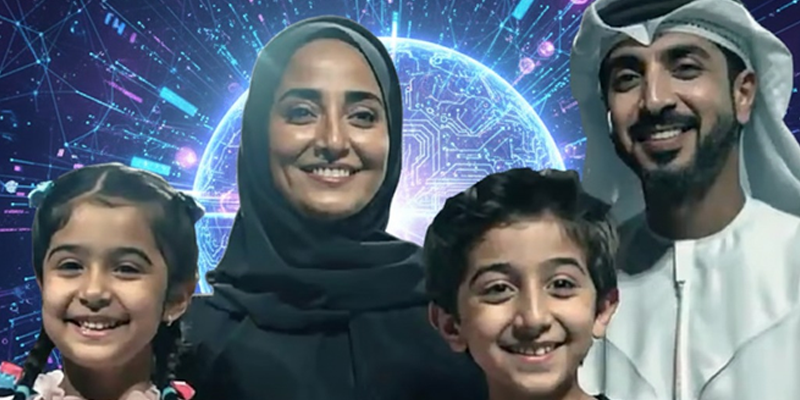
Dubai has always positioned itself at the forefront of
technological innovation, and the launch of the AI-Powered
Emirati Family project is a landmark step in this journey. First
unveiled by Digital Dubai in July 2025, the project introduced the
world’s first AI-generated Emirati family designed to raise awareness of digital
services and strengthen connections between government platforms and the public.
The debut character, known as “The Girl”, symbolizes a new era of AI-driven cultural storytelling. Residents were even invited to participate in naming her, turning the initiative into a collaborative civic experience (Digital Dubai, Gulf Business). Over time, more members will be introduced — parents, siblings, and grandparents — creating a full AI family that reflects the multigenerational fabric of Emirati society (Entrepreneur).
This pioneering initiative isn’t just a symbolic gesture; it is a practical tool to humanize how AI communicates complex topics like digital governance, e-services, and smart city tools. In fact, it has quickly become a reference point for AI in digital marketing Dubai, proving how advanced storytelling frameworks can integrate seamlessly into official communication strategies.
At its core, the Emirati Family AI project represents a shift from transactional to emotional engagement between institutions and citizens. As highlighted by Gulf News and Gulf Business, Dubai’s government understood that technical explanations alone don’t resonate deeply with communities. By embodying digital services through relatable AI avatars, the city bridges the gap between innovation and cultural authenticity.
">This matters because public trust is crucial for adoption of smart city services. An AI family rooted in Emirati values ensures that technology is perceived not as foreign or mechanical, but as familiar, approachable, and inclusive. This strengthens digital governance, improves awareness of e-services, and reinforces Dubai’s image as a global leader in AI marketing strategies UAE.
From a cultural perspective, the project respects and celebrates Emirati traditions while showcasing Dubai’s ambition to be a global digital hub. It reflects how AI can be localized to speak in the language of heritage and identity — something marketing agencies and governments worldwide are closely watching.
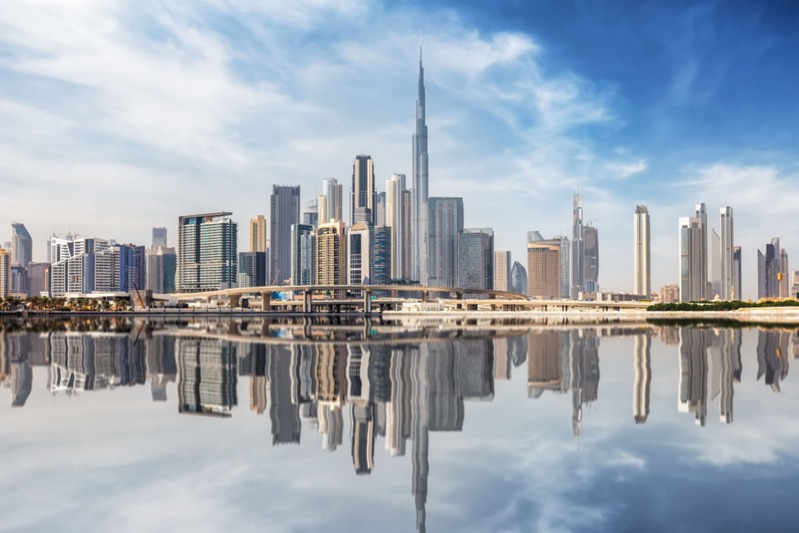
The launch of the Emirati Family is directly aligned with Dubai’s broader transformation agenda. Initiatives like Smart Dubai and Digital Dubai were created to make the city the smartest, happiest place on earth. According to Digital Dubai and Gulf News, this vision rests on three pillars: cutting-edge technology, citizen happiness, and seamless digital governance.
By introducing AI characters into the communication framework, Dubai demonstrates how AI can drive digital literacy while improving adoption of services. For marketers, this sets a benchmark: AI in digital marketing Dubai is not just about automation or analytics, but about embedding cultural intelligence into campaigns.
The UAE has been steadily building a tech ecosystem powered by artificial intelligence. Fast Company ME and Digital Dubai report that conversational AI tools, natural language processing, and virtual avatars are now central to public communication strategies.
These technologies make digital services more engaging, intuitive, and human-like. Instead of static messages, residents now interact with characters who embody both cultural familiarity and technological sophistication. For marketers, this offers a roadmap: brands can use avatars and AI characters as campaign ambassadors, transforming customer engagement and setting new standards for AI marketing strategies UAE.
A successful marketing strategy in Dubai must recognize its diverse audience: citizens, residents, and global visitors. Smart Cities World and The Times of India emphasize that audiences expect services that are multilingual, multigenerational, and aligned with cultural values. Trust and relatability are non-negotiable.
The Emirati Family AI project answers these expectations perfectly. Characters like “The Girl” appeal to younger audiences, while future family members will resonate with parents and elders. The initiative proves that AI in digital marketing Dubai cannot be one-size-fits-all. It must respect identity, deliver inclusivity, and provide information in a format people feel comfortable with.
For advertising agencies, the lesson is clear: whether you’re designing campaigns for retail, real estate, or government, strategies that weave cultural narratives into AI will define the future of marketing in the UAE.
The first family member, “The Girl”, was developed with a blend of tradition and modernity. Digital Dubai and Gulf Business highlight how her design was carefully curated to reflect Emirati attire, values, and aesthetics while also appealing to digitally savvy youth.
Her story isn’t static — she evolves as part of an unfolding narrative that integrates education, awareness, and cultural identity. This is more than a campaign mascot: it is a storytelling tool that makes government communication human and relatable. For agencies, it demonstrates how AI marketing strategies UAE can be rooted in authentic character design.
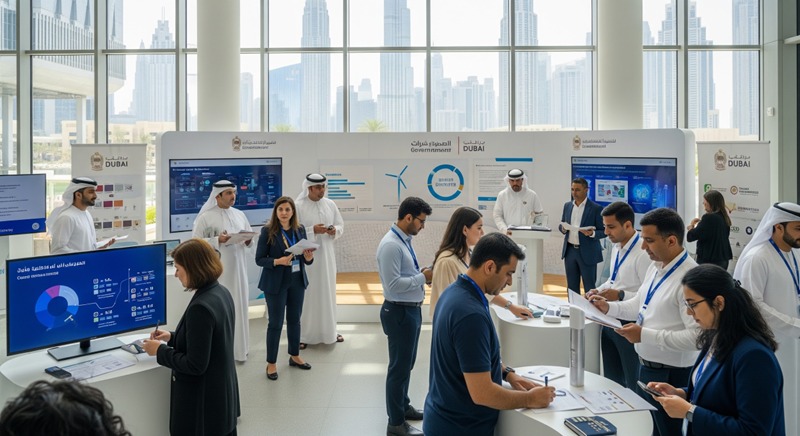
One of the project’s strongest innovations is its interactive approach. Digital Dubai
and Gulf Business note that citizens were invited to suggest names for “The Girl”. This
voting mechanism did more than decide a name; it gave the community ownership of the initiative.
Such feedback loops deepen engagement, increase visibility, and build trust. When users feel they helped shape an AI character, they are more likely to embrace the digital services it promotes. This is a crucial lesson for marketers: interactive campaigns powered by AI avatars can drive audience participation, loyalty, and long-term engagement.
As Gulf News and Fast Company ME underline, the Emirati Family AI project is not just symbolic. Its primary communication goal is to simplify complex e-government services into digestible, relatable formats. By using culturally familiar characters, Dubai ensures inclusivity across languages, generations, and literacy levels.
This directly connects to the evolving field of AI in digital marketing Dubai. Just as Dubai uses avatars to explain smart city tools, brands and advertising agencies in Dubai can use AI characters to simplify product benefits, increase relatability, and connect with diverse audiences. The inclusivity framework established here can become a global case study in AI marketing strategies UAE.
The Emirati Family AI project is more than a government initiative; it is a masterclass in AI-driven storytelling. Virtual avatars like “The Girl” showcase how brands can humanize digital messages. Instead of abstract campaigns, audiences connect with a character who speaks their language and mirrors their culture.
For agencies and marketers, this is a clear signal: virtual characters can be used as brand ambassadors to deliver personalized, engaging narratives. In sectors like real estate, education, and retail, avatars can simplify complex offerings and resonate with diverse demographics. By taking inspiration from this project, companies can reimagine AI in digital marketing Dubai not only as a tool for automation but as a platform for emotional storytelling.
One of the standout features of the Emirati Family AI project is how it blends modern AI with traditional Emirati values. The characters are not generic avatars; they are rooted in identity, attire, and narrative that reflect the UAE’s heritage.
For marketers, this highlights a crucial truth: campaigns that respect and reflect social identity outperform those that ignore cultural nuance. AI marketing strategies UAE must therefore be localized — integrating language, customs, and values into their design. When AI mirrors the culture of its audience, it builds trust, fosters inclusivity, and strengthens long-term loyalty.
The success of the Emirati Family lies in its multi-channel execution. From social media videos to interactive name-voting campaigns, the project reached audiences across multiple touchpoints. This approach is essential for modern marketing.
Brands in Dubai can replicate this by deploying AI avatars across video campaigns, Instagram Reels, YouTube explainers, and interactive web tools. Offline touchpoints — billboards, events, and public installations — can amplify reach. A multi-channel rollout ensures that AI in digital marketing Dubai connects with both digital natives and traditional audiences, reinforcing awareness and adoption.
No campaign is complete without measurement. The Emirati Family AI project sets a precedent for tracking engagement through metrics beyond clicks and impressions. Key KPIs include:
By applying these metrics, agencies can evaluate the effectiveness of AI marketing strategies UAE, ensuring that AI characters generate both awareness and measurable impact.
For agencies, the Emirati Family sets a new bar for capability. A future-ready advertising agency must combine four strengths:
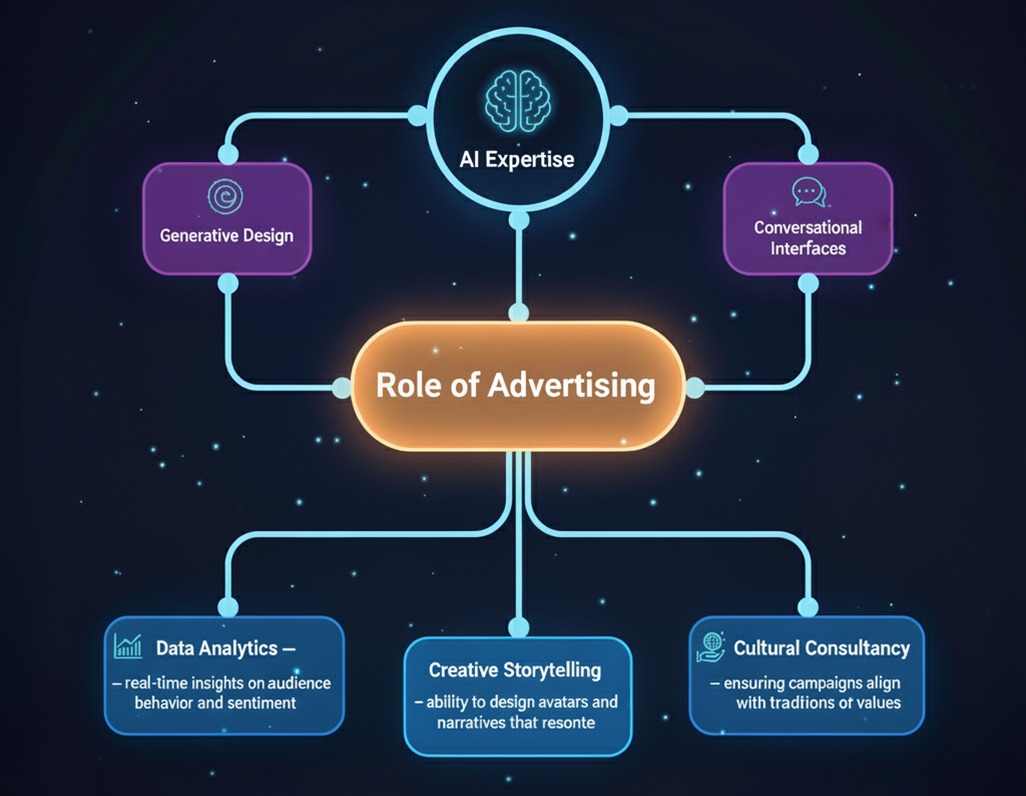
Several sectors in the UAE are ripe for this approach:
By applying lessons from the Emirati Family AI project, agencies can craft campaigns that are interactive, relatable, and memorable — hallmarks of effective AI in digital marketing Dubai.
While promising, AI marketing carries challenges:
Forward-looking agencies must prepare strategies to mitigate these risks while maintaining cultural sensitivity.
The September 2025 update has made it clear: ranking well requires more than keywords. AI-Mode now prioritizes depth, authority, and structured insights. Blogs that analyze projects like the Emirati Family AI project with references to trusted sources are rewarded. Original commentary, semantic keyword integration, and clear hierarchy of H2/H3 sections are essential.
To rank well:
AI-Mode algorithms favor engagement. Including multimedia content like avatar videos, infographics, and polls boosts dwell time and shareability. The Emirati Family’s name-voting campaign is a prime example of interactivity that increases visibility. For marketers, embedding similar interactive tools is crucial to dominate SERPs.
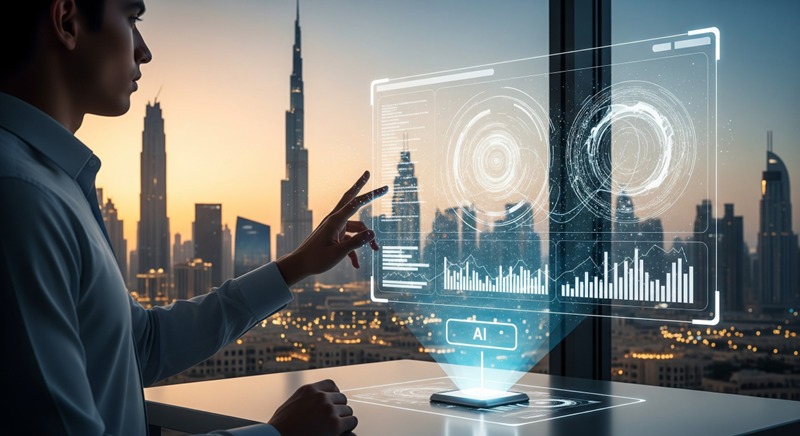
Future iterations could include:
The UAE is already exploring AR/VR and voice assistants. By 2030, AI avatars could become personal assistants guiding citizens through government services. For brands, personalization powered by AI will redefine how campaigns are experienced in the region.
To sustain impact, campaigns must:
Public-private collaborations can amplify reach. Agencies should align with initiatives like Digital Dubai to co-create campaigns that resonate across civic and commercial spaces.
The Emirati Family AI project is more than a showcase of innovation — it is a blueprint for the future of AI in digital marketing Dubai. By weaving tradition into technology, Dubai has demonstrated how culture, trust, and interactivity can shape campaigns that resonate at scale.
For marketers, the lesson is clear: success in the UAE will come from AI marketing strategies UAE that balance innovation with authenticity. With the right cultural sensitivity, agencies can craft campaigns as impactful as this initiative.
For every advertising agency in Dubai, the call to action is urgent: embrace AI, respect identity, and drive engagement through storytelling that reflects the people it serves. The future of marketing in the UAE will belong to those who combine heritage with technology to create human-centered AI campaigns.